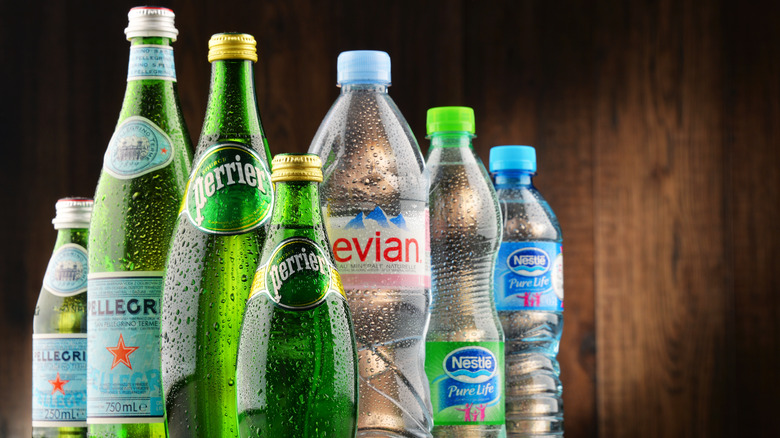Why Some Bottled Water Brands Are So Expensive
Some bottled water brands cost next to nothing, while others can set you back hundreds of dollars. For example, a bottle of Svalbardi is sold for more than $116 in the U.S. and most other countries. What you'll get is pure iceberg water from Kongsfjorden, an Arctic fjord system located not far from the North Pole. The bottle is made of flint glass, a durable material used for lenses, prisms, and collectible dinnerware.
Back in 2020, Evian launched a limited-edition bottled water in collaboration with designer Virgil Abloh. The price was around $100 per bottle. Other brands, such as Fillico and Nevas, charge more than $1,000 for 1 liter of bottled water. Bling H2O, which is dubbed "water for the stars," costs around $219 per liter. The bottles are adorned with crystals and contain water treated with reverse osmosis. Voss, LaCroix, Perrier, and other sparkling water brands have a high price tag, too, but they're still easier on the pocket than Filico, Svalbardi, or Bling H2O.
These differences in pricing are rarely justified. Sure, you'd expect to pay more for a fancy bottle. But, with a few exceptions, the water itself isn't that special. Should you go with the flow and splurge on these products or save your money for other stuff?
Why do some brands charge extra for bottled water?
The average American drinks more than 45 gallons of bottled water per year, but few consumers are willing to pay for premium water brands. Most people opt for private-label bottled water, which costs significantly less than Evian, Glacéau, or Bling H2O. The differences in pricing are due to several factors, including where the water comes from, the production process, and the brand's marketing and packaging.
In some cases, premium brands use unique or rare water sources, causing the price to go up. For example, Svalbardi and other vendors sell pure iceberg water, which is known for its purity. One company even claims that iceberg water can treat diabetes, cancer, and skin conditions, detox the body, and improve sleep. (As of today, there are no studies to support these claims.) As it turns out, bottled water advertisers resort to death reminders (e.g., "Evian, drink young") and messages of self-esteem to sell their products, notes a 2017 study published in Applied Environmental Education & Communication.
Some brands also sell the water in fancy bottles to create a perception of exclusivity. For instance, the Japanese brand Fillico offers a unique selection of bottles resembling chess pieces, angels, or wedding dresses. Most bottles are adorned with real diamonds, crystals, gemstones, or gold details. In such cases, the bottle itself is a status symbol, so you're paying for the packaging.
Is premium bottled water worth the price?
While there may be some differences in taste or quality between premium and regular bottled water, we need to look beyond the marketing hype. For starters, there are plenty of reasons you shouldn't drink bottled water. In fact, you'd be better off buying a home water filter and reusable bottles. Second, there's no proof that premium bottled water is any better than tap water, says the University of Waterloo. They're equally safe and taste the same, as shown in blind taste tests.
Additionally, premium bottled water is often promoted as being more alkaline than its regular counterpart. The thing is, no food or beverage can change the pH of your blood, notes the University of Texas MD Anderson Cancer Center. Some high-end brands also add calcium, magnesium, and other trace minerals to bottled water — but so do regular brands such as SmartWater and Nestlé Pure Life. You'll actually find these minerals in tap water, too.
All in all, luxury bottled water isn't safer or more nutritious than regular bottled water. Some brands source their water from springs or icebergs, but this doesn't necessarily translate to better health. Ultimately, it's up to you to decide whether or not premium bottled water is worth the price. There's nothing wrong with splurging on a bottle of Fillico or Bling H2O if you're a collector or someone who values luxury.


